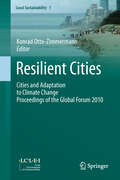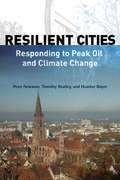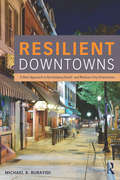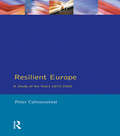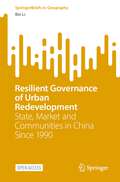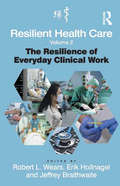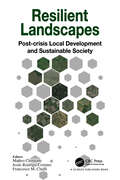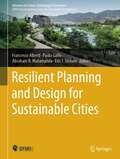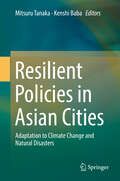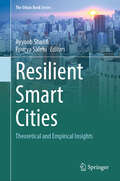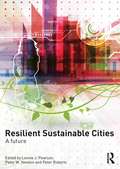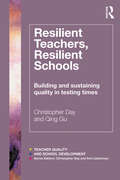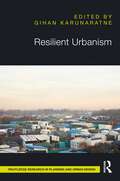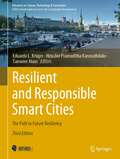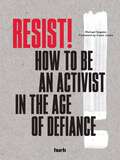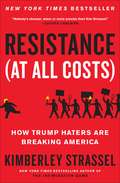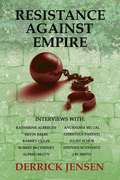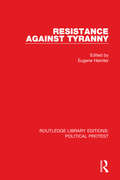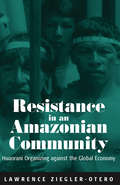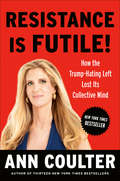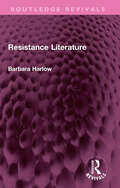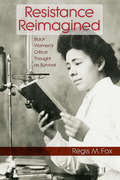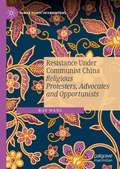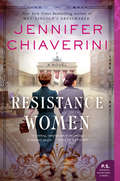- Table View
- List View
Resilient Cities: Cities and Adaptation to Climate Change - Proceedings of the Global Forum 2010
by Konrad Otto-ZimmermannEven with significant reductions of greenhouse gas emissions, a certain degree of climate change will inevitably occur. Adapting to climate change, then, will become a necessary step in reducing the vulnerability of many regions across the globe. This is especially true for urban areas where climate change has been shown to have particularly destabilizing effects. Through the identification and analysis of the most relevant impacts facing urban areas, this book makes clear the need to incorporate climate change concerns into the mainstream of local planning, governance and policy making practices. Adaptation as a workable concept within urban areas cannot be treated in isolation from the many pre-existing challenges facing cities. By offering numerous examples of ongoing adaptation programs and strategies across a wide range of contexts, the authors show the growing potential of cities in the fight against climate change. This book has its origins in a collection of papers originally presented at the Resilient Cities 2010 Congress in Bonn, Germany (May 2010), the first global forum on cities and adaptation to climate change, convened by ICLEI - Local Governments for Sustainability. In this volume, the first in a new series dedicated to this annual event, a range of contributors bring their perspectives to bear on the most pressing issues and controversies surrounding adaptation to climate change within cities. These writings will prove invaluable to anyone interested in understanding and confronting climate change at the local level.
Resilient Cities: Responding to Peak Oil and Climate Change
by Timothy Beatley Peter Newman Heather M. BoyerThe authors of this spirited book don't believe that oblivion is necessarily the destiny of urban areas. Instead, they believe that intelligent planning and visionary leadership can help cities meet the impending crises, and look to existing initiatives in cities around the world. Rather than responding with fear (as a legion of doomsaying prognosticators have done), they choose hope. This is not a book filled with "blue sky" theory (although blue skies will be a welcome result of its recommendations). Rather, it is packed with practical ideas, some of which are already working in cities today. It frankly admits that our cities have problems that will worsen if they are not addressed, but it suggests that these problems are solvable. And the time to begin solving them is now.
Resilient Downtowns: A New Approach to Revitalizing Small- and Medium-City Downtowns
by Michael A. BurayidiResilient Downtowns provides a guide to communities in reviving and redeveloping their core districts into resilient, thriving neighborhoods. While the National Main Street program’s four-point approach of organization, promotion, economic restructuring, and design has been standard practice for cities seeking to rejuvenate their downtowns for decades there is disquiet among downtown managers and civic leaders about the versatility of the program. Resilient Downtowns provides communities with the "en-RICHED" approach, a four-step process for downtown development, which focuses on residential development, immigration strategies, civic functionality, heritage tourism, and good design practice. Examples from fourteen small cities across the US show how this process can revitalize downtowns in any city.
Resilient Europe: A Study of the Years 1870-2000
by Peter CalvocoressiFirst published in 1992. Routledge is an imprint of Taylor & Francis, an informa company.
Resilient Governance of Urban Redevelopment: State, Market and Communities in China Since 1990 (SpringerBriefs in Geography)
by Bin LiTo examine the origins, characteristics, and outcomes of resilient governance with Chinese characteristics, this open access book takes Guangzhou, a typical Chinese city from 1990 to 2015, as an example. Through participant observation, semi-structured interviews, and the collection of secondary data, this book finds that (1) the institutional context can be described as an authoritarian land-oriented pro-growth regime; (2) there are three phases with different patterns of governance: the Primitive Market Phase (1990–1998), the Pure Government Phase (1998–2006) and the Multiple Players Phase (2006–2015); (3) redevelopment can serve as a model of resilient governance because it changes in time in a dynamic environment to maximise economic growth; (4) an authoritarian land-oriented pro-growth regime is the key to support such a resilient governance model. This is an open access book.
Resilient Health Care, Volume 2: The Resilience of Everyday Clinical Work (Ashgate Studies in Resilience Engineering)
by Robert L. Wears Erik HollnagelHealth systems everywhere are expected to meet increasing public and political demands for accessible, high-quality care. Policy-makers, managers, and clinicians use their best efforts to improve efficiency, safety, quality, and economic viability. One solution has been to mimic approaches that have been shown to work in other domains, such as quality management, lean production, and high reliability. In the enthusiasm for such solutions, scant attention has been paid to the fact that health care as a multifaceted system differs significantly from most traditional industries. Solutions based on linear thinking in engineered systems do not work well in complicated, multi-stakeholder non-engineered systems, of which health care is a leading example. A prerequisite for improving health care and making it more resilient is that the nature of everyday clinical work be well understood. Yet the focus of the majority of policy or management solutions, as well as that of accreditation and regulation, is work as it ought to be (also known as ’work-as-imagined’). The aim of policy-makers and managers, whether the priority is safety, quality, or efficiency, is therefore to make everyday clinical work - or work-as-done - comply with work-as-imagined. This fails to recognise that this normative conception of work is often oversimplified, incomplete, and outdated. There is therefore an urgent need to better understand everyday clinical work as it is done. Despite the common focus on deviations and failures, it is undeniable that clinical work goes right far more often than it goes wrong, and that we only can make it better if we understand how this happens. This second volume of Resilient Health Care continues the line of thinking of the first book, but takes it further through a range of chapters from leading international thinkers on resilience and health care. Where the first book provided the rationale and basic concepts of RHC, the Resilience of Everyday Clinical Work b
Resilient Landscapes: Post-crisis Local Development and Sustainable Society
by Jesús Rodrigo-Comino Matteo Clemente Francesco M. ChelliIn recent years, resilient districts have become territorial contexts for projects designed to respond to the needs of local communities, through the exploitation of landscape peculiarities to overcome the economic crisis. This volume offers a comprehensive insight on sustainable development of local territories. It recommends the planning of local interventions through the integration of sustainable development with resilience of local systems. The chapters originate from either individual or collective work independently conducted, but at the same time integrated by scholars from different academic backgrounds, among which environmental and agrarian sciences, social and economic disciplines, and urban planning and landscape design are included.
Resilient Liberalism in Europe's Political Economy
by Vivien A. Schmidt Mark ThatcherWhy have neo-liberal economic ideas been so resilient since the 1980s, despite major intellectual challenges, crippling financial and political crises, and failure to deliver on their promises? Why do they repeatedly return, not only to survive but to thrive? This groundbreaking book proposes five lines of analysis to explain the dynamics of both continuity and change in neo-liberal ideas: the flexibility of neo-liberalism's core principles; the gaps between neo-liberal rhetoric and reality; the strength of neo-liberal discourse in debates; the power of interests in the strategic use of ideas; and the force of institutions in the embedding of neo-liberal ideas. The book's highly distinguished group of authors shows how these possible explanations apply across the most important domains - fiscal policy, the role of the state, welfare and labour markets, regulation of competition and financial markets, management of the Euro, and corporate governance - in the European Union and across European countries.
Resilient Planning and Design for Sustainable Cities (Advances in Science, Technology & Innovation)
by Eric J. Strauss Francesco Alberti Abraham R. Matamanda Paola GalloThis book discusses a crucial paradigm shift in urban planning and architectural design, addressing the urgent need for sustainability and adaptation in the face of rapidly changing climate and urban landscapes. Ideal for urban planners, architects, researchers, and policymakers, this book weaves together cutting-edge research and innovative applications from the 7th edition of the international conference on Urban Planning and Architectural Design for Sustainable Development organized by IEREK in collaboration with the Architecture Department at the University of Florence, Italy. Through a collection of double-blind peer-reviewed papers, it offers a cohesive narrative emphasizing the vital role of spatial design at all scales. Readers will explore diverse case studies, from bustling megacities to forgotten villages, showcasing the local impacts of global challenges and the efforts to prevent, neutralize or mitigate them. With an insightful blend of qualitative and quantitative methods, the book uncovers the multi-functionality of blue-green infrastructure, the potentials of urban voids, and the urgent need for ecological transition. Unveiling the gap between current governance instruments and pressing challenges, this book serves as a compass for crafting inclusive, livable, and environmentally conscious cities and communities.
Resilient Policies in Asian Cities: Adaptation to Climate Change and Natural Disasters
by Mitsuru Tanaka Kenshi BabaThis book presents a comprehensive framework and indicators that can be used to assess a city’s degree of resilience. Based on surveys using bottom-up assessment tools, it proposes the concept, framework and indicators of a resilient policy model (including some participatory approaches). It also presents case studies of this and similar tools applied to Japanese and Asian cities, the highlights including information not previously available in English. Today, the term “resilience” is prevalent in the context of sustainable societies. The IPCC AR5 published in 2014 again stressed the impact of climate change on natural disasters, while in March 2015 at the World Conference on Disaster Risk Reduction, the United Nations International Strategy of Disaster Reduction (UNISDR) published the Sendai Framework for Disaster Risk Reduction Action 2015-2030 , which serves as a guideline for local governments. Offering transdisciplinary perspectives from fields such as policy science, urban planning, environmental science, social psychology, management development and geography, this book discusses the lessons learned from Asian case studies, explaining the challenges and the effectiveness of the tools, and offering transdisciplinary insights for policymakers.
Resilient Smart Cities: Theoretical and Empirical Insights (The Urban Book Series)
by Ayyoob Sharifi Pourya SalehiThis book provides a thorough guide to building resilient cities, through the use of smart solutions enabled by information and communication technologies. It introduces innovative approaches for integrating smart solutions into urban resilience planning and offers numerous global case studies to illustrate the benefits of the theories discussed. Against a background of increased natural disasters, pandemics, and climate change, this book answers research questions such as: • Do smart city projects contribute to urban climate resilience?• What are the indicators of smart city resilience?• What procedures should be taken to improve efficacy of smart city solutions?• What are the opportunities and challenges for promoting smart city resilience and for integrating resilience thinking into smart city planning? Including contributions from international experts, explanatory illustrations, and data-driven tables, this book is of interest to researchers, policymakers, and graduate students focused on developing more sustainable, smart, and resilient cities.
Resilient Sustainable Cities: A Future
by Peter Roberts Leonie J. Pearson Peter W. NewtonUrbanization is occurring at an unprecedented rate; by 2050 three quarters of the world’s people will live in urban environments. The cars we drive, products we consume, houses we live in and technology we use will all determine how sustainable our cities will be. Bridging the increasing divide between cross-disciplinary academic insights and the latest practical innovations, Resilient Sustainable Cities provides an integrated approach for long term future planning within the context of the city as a whole system. In the next 30 years cities will face their biggest challenges yet, as a result of long term, or ‘slow burn’ issues: population growth will stretch to the breaking point urban infrastructure and service capacity; resource scarcity, such as peak oil; potable water and food security, will dramatically change what we consume and how; environmental pressures will change how we live and where and; shifting demographic preferences will exacerbate urban pressures. Cities can’t keep doing what they’ve always done and cope – we need to change current urban development to achieve resilient, sustainable cities. Resilient Sustainable Cities provides practical and conceptual insights for practitioners, researchers and students on how to deliver cities which are resilient to ‘slow burn’ issues and achieve sustainability. The book is organized around three overarching themes: pathways to the future innovation to deliver the future leadership and governance issues The book includes a variety of perspectives conveyed through international case studies and examples of cities that have transformed for a sustainable future, exploring their successes and failures to ensure that readers are left with ideas on how to turn their city into a resilient sustainable city for the future.
Resilient Teachers, Resilient Schools: Building and sustaining quality in testing times (Teacher Quality and School Development)
by Christopher Day Qing GuThis book unpicks the complex, dynamic blend of individuals’ psychological and professional assets, workplace conditions and leadership support which enable teachers who stay in teaching to continue to make a difference in their careers, regardless of shifts in policy, workplace, professional and personal circumstances. Whilst much has been written over the years about teacher stress and burnout, there is very little research which reports on the conditions which are essential for teachers to sustain their commitment and effectiveness over their professional lives, in contexts of challenge and change. Drawing upon a range of educational, psychological, socio-cultural and neuro-scientific research, together with vivid accounts from teachers in a variety of primary and secondary schools internationally, and from their own research on teachers’ work and identities, the authors discuss the dynamic nature, forms and practices of teacher resilience. They argue that resilience in teachers is not only their ability to bounce back in extremely adverse circumstances but that it is the capacity of teachers for everyday resilience which enables them to sustain their commitment and effectiveness in responding positively to the unavoidable uncertainties inherent of their professional lives. The authors conclude that resilience in teachers can be nurtured by the intellectual, social and organisational environments in which teachers work and live, rather than being simply a personal attribute or trait, determined by nature. Resilient Teachers, Resilient Schools will be of key interest to policy makers, head teachers, teachers and training and development organisations who wish to improve quality and standards in schools.
Resilient Urbanism (Routledge Research in Planning and Urban Design)
by Gihan KarunaratneAs urban populations grow unprecedentedly, cities worldwide face pressures from rapid expansion, climate change, and social inequalities. Resilient Urbanism critically examines how cities, towns, and informal settlements adapt to these multifaceted challenges, exploring urban resilience in the 21st century.This volume investigates resilience across a variety of urban contexts, from megacities in the Global South to suburban and coastal regions, through interdisciplinary essays. The contributors examine how urban communities confront crises, navigate urbanization, adapt to climate change, and respond to socioeconomic transformations using innovative and, at times, unconventional strategies. Case studies highlight the lived experiences of urban dwellers, from informal settlements in Maputo, Rio de Janeiro, and Hanoi to the challenges of achieving energy efficiency in Buenos Aires.By interrogating dominant discourses on urban resilience, Resilient Urbanism offers a reimagined perspective on how cities and their inhabitants address uncertainty and change. It emphasizes the everyday practices of urban residents and explores the sociopolitical dynamics of urbanization, presenting resilience not merely as a theoretical framework but as a lived, evolving process. This work sheds light on how cities withstand crises and actively reshape themselves in response to these disruptions.This volume is an essential resource for scholars, urban planners, policymakers, and professionals concerned with the future of cities. It underscores that urban resilience is not just a theoretical concept but a vital imperative for navigating the complexities of a rapidly changing global landscape.
Resilient and Responsible Smart Cities: The Path to Future Resiliency (Advances in Science, Technology & Innovation)
by Eduardo L. Krüger Tanweer Alam Hirushie Pramuditha KarunathilakeThis book is a compilation of diverse, yet homogenic, research papers that discuss current advances in Earth Observation and Geospatial Information Technologies to tackle new horizons concerning the digitization and information management in smart cities’ infrastructures. The book also tackles the challenges faced by urban planners by the new mega-cities and proposes a series of solutions to resolve complex urban issues. It suggests enhancing the integration of disciplines, thus, bringing together architects, urban planners, civil engineers, landscape designers and computer scientists to address the problems that our cities are facing. This book is a culmination of selected research papers from IEREK’s fourth edition of the International Conference on Future Smart Cities (FSC) and the fourth edition of the International Conference on Resilient and Responsible Architecture and Urbanism (RRAU) held online in collaboration with the XMUM, Selangor, Malaysia (2021).
Resist!: How to Be an Activist in the Age of Defiance
by HuckResist! is the indispensable how-to guide for people looking to make a stand. Included are solid pieces of advice, practical tips and inspirational stories from those who have already successfully stood up and made a difference. Learn the principles of direct action, discover strategies for tackling social media, unearth ideas for motivating others, and understand how to get access to the people in power and get your message across.With a foreword by columnist, campaigner and best-selling author Owen Jones which unravels the political world and underlines why now is the time to act.
Resistance (At All Costs): How Trump Haters Are Breaking America
by Kimberley StrasselWall Street Journal columnist and bestselling author Kim Strassel argues how the all-out "Resistance" has become dangerously reckless in its obstruction of President Trump. <P><P>Among the most consistent and aggressive criticisms of Donald Trump is that he is a threat to American democracy -- a human wrecking ball demolishing our most basic values and institutions. Resistance (At All Costs) makes the opposite case -- that it is Trump's critics, in their zeal to oppose the president, who are undermining our foundations. <P><P>From the FBI's unprecedented counterintelligence investigation into the Trump campaign, to bureaucratic sabotage, to media partisanship, to the drive-by character assassination of Trump nominee Brett Kavanaugh, the president's foes have thrown aside norms, due process and the rule of law. <P><P>Resistance (At All Costs) shows that the reaction to Trump will prove far more consequential and damaging to our nation long-term than Trump's time in office. <P><P><b>A New York Times Bestseller</b>
Resistance Against Empire
by Derrick JensenA scathing indictment of U. S. domestic and foreign policy, this collection of interviews gathers incendiary insights from 10 of today's most eperienced and knowledgeable activists. Whether it's Ramsey Clark describing the long history of military invasion, Alfred McCoy detailing the relationship between CIA activities and the increase in the global heroin trade, Stephen Schwartz reporting the obscene costs of nuclear armaments, or Katharine Albrecht tracing the horrors of the modern surveillance state, this investigation of global governance is sure to inform, engage, and incite readers. This book explores many of the consequences of empire and the methods it uses to enforce its license to extract and exploit. Anuradha Mittal describes the effects of colonialism and global trade on food security. Juliet Schor, Katherine Albrecht, and Christian Parenti discuss some of the mechanisms of repression on the home front, as citizens at its center are overworked, surveilled, and imprisoned. J.W. Smith explains how empire begins in the monopolization of land and ends in a global economy based on total control. These voices, together with the others in this book, comprise a strong indictment against the empire that holds our planet hostage to its ruthless appetite.
Resistance Against Tyranny (Routledge Library Editions: Political Protest #20)
by Eugene HeimlerThis book, first published in 1966, focuses on the stories of ordinary people who have stood up to tyrants around the world. A German opposes Hitler; a Rabbi in South Africa protests apartheid; an Algerian lawyer remains true to the law; a Polish writer fights the Nazis, and the Communists; an Irish playwright is caught up in the fight against the British; and a Hungarian Jewish poet recites poetry in concentration camps. Together they form an examination of political opposition, and a testimony.
Resistance In An Amazonian Community
by Lawrence Ziegler-OteroLike many other indigenous groups, the Huaorani of eastern Ecuador are facing many challenges as they attempt to confront the globalization of capitalism in the 21st century. In 1991, they formed a political organization as a direct response to the growing threat to Huaorani territory posed by oil exploitation, colonization, and other pressures. The author explores the structures and practices of the organization, as well as the contradictions created by the imposition of an alien and hierarchical organizational form on a traditionally egalitarian society. This study has broad implications for those who work toward "cultural survival" or try to "save the rainforest."
Resistance Is Futile!: How the Trump-Hating Left Lost Its Collective Mind
by Ann CoulterSince the day Donald Trump announced his presidential campaign, the left has waged a demented war against him. Liberals used to pride themselves on their ultra-hipness, but Trump has turned them into weeping little girls in pink party dresses. <p><p>The very people who once mocked right-wingers for (allegedly) overreacting to every little thing are now the ones hyperventilating and hatching insane conspiracy theories. <p><p>During the campaign, and even more so after his victory, the left went nuts. Everything Trump does sends them into a moral panic. Everything is a constitutional crisis.Members of the self-proclaimed "Resistance" -- journalists, politicians, professors, judges, comedians, movie stars, Twitter pundits, even Oprah and Lindsey Vonn! -- are literally shaking because Trump is literally Hitler! <p><p>Now Ann Coulter skewers the various elements of "The Resistance" -- the pussy-hat brigade, the Russian-collusion witch hunters, the media alarmists, the campus hysterics, and more. They talk about Russia? They're the ones meddling with our democracy by trying to overturn the results of the election with their relentless attacks. <p><p>The biggest result of the Trump era may be our cultural institutions' total loss of credibility. <P><b>A New York Times Bestseller</b>
Resistance Literature (Routledge Revivals)
by Barbara HarlowAs one of the foundational texts in the field of postcolonial writing, Barbara Harlow’s Resistance Literature introduced new ground in Western literary studies. Originally published in 1987 and now reissued with a new Preface by Mia Carter, this powerfully argued and controversial critique develops an approach to literature which is essentially political. Resistance Literature introduces the reader to the role of literature in the liberation movements of the developing world during the 20th Century. It considers a body of writing largely ignored in the west. Although the book is organized according to generic topics – poetry, narrative, prison memoirs – thematic topics, and the specific historical conditions that influence the cultural and political strategies of various resistance struggles, including those of Palestine, Nicaragua and South Africa, are brought to the fore. Among the questions raised are the role of women in the developing world; communication in circumstances of extreme atomization; literature versus propaganda; censorship; and the problem of adopting literary forms identified with the oppressor culture.
Resistance Reimagined: Black Women's Critical Thought as Survival
by Regis M. FoxResistance Reimagined highlights unconventional modes of black women's activism within a society that has spoken so much of freedom but has granted it so selectively. Looking closely at nineteenth- and twentieth-century writings by African American women that reimagine antebellum America, Regis Fox introduces types of black activism that differ from common associations with militancy and maleness. In doing so, she confronts expectations about what African American literature can and should be. Fox analyzes Harriet Wilson's Our Nig, Elizabeth Keckly's Behind the Scenes, Anna Julia Cooper's A Voice From the South, and Sherley Anne Williams's Dessa Rose. The thinkers highlighted by Fox have been dismissed as elitist, accommodationist, or complicit—yet Fox reveals that in reality, these women use their writing to protest antiblack violence, reject superficial reform, call for major sociopolitical change, and challenge the false promises of American democracy.
Resistance Under Communist China: Religious Protesters, Advocates and Opportunists (Human Rights Interventions)
by Ray WangThis book examines religious activism—Christianity, Buddhism, and Taoism—in China, a powerful atheist state that provides one of the hardest challenges to existing methods of transnational activism. The author focuses on mechanisms used by three kinds of actors: protesters, advocates and opportunists, and uses regional, inter-faith, and international comparisons to understand why some foreign advocates can enter China and engage in illegal aid and missions to empower local activists, while the same groups cannot conduct the same activities in another geographically, economically and politically similar location. The stories in this book demonstrate a more inclusive and bottom-up approach of transnational activism; they challenge the conventional spiral theory paradigm of human rights literature and the narrow views about GONGOs in civil society literature. This new knowledge helps to sustain a more optimistic view and offers an alternative way of promoting human rights in China and countries with similar authoritarian environments.
Resistance Women: A Novel
by Jennifer ChiaveriniFrom the New York Times bestselling author of Mrs. Lincoln’s Dressmaker, an enthralling historical saga that recreates the danger, romance, and sacrifice of an era and brings to life one courageous, passionate American—Mildred Fish Harnack—and her circle of women friends who waged a clandestine battle against Hitler in Nazi Berlin.After Wisconsin graduate student Mildred Fish marries brilliant German economist Arvid Harnack, she accompanies him to his German homeland, where a promising future awaits. In the thriving intellectual culture of 1930s Berlin, the newlyweds create a rich new life filled with love, friendships, and rewarding work—but the rise of a malevolent new political faction inexorably changes their fate. As Adolf Hitler and his Nazi Party wield violence and lies to seize power, Mildred, Arvid, and their friends resolve to resist. Mildred gathers intelligence for her American contacts, including Martha Dodd, the vivacious and very modern daughter of the US ambassador. Her German friends, aspiring author Greta Kuckoff and literature student Sara Weitz, risk their lives to collect information from journalists, military officers, and officials within the highest levels of the Nazi regime. For years, Mildred’s network stealthily fights to bring down the Third Reich from within. But when Nazi radio operatives detect an errant Russian signal, the Harnack resistance cell is exposed, with fatal consequences. Inspired by actual events, Resistance Women is an enthralling, unforgettable story of ordinary people determined to resist the rise of evil, sacrificing their own lives and liberty to fight injustice and defend the oppressed.
